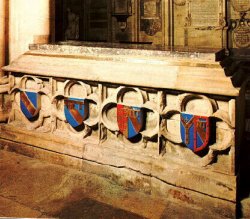
Richard le Scrope, Archbishop of York
Born: c. 1350
Died: June 8, 1405
York, Yorkshire, England (Age c.55)
Archbishop Scrope in History
Richard Scrope began his life in the field of religion in 1368 while still a teenager. Over the next thirty years Scrope would continue his success in the church by holding a large number of important positions (including several bishoprics) and receiving an excellent education between Oxford and Cambridge. Scrope spent a good amount of time in Rome and was created Archbishop of York while he was there in 1398. The following year, when King Richard II was deposed by Henry Bolingbroke, the new Archbishop played a part in putting the new King Henry IV on the throne. In 1403, the Percies (the northern family who had been instrumental in putting Henry on the throne) rebelled against the king. Evidence points against Scrope's involvement in the failed Percy rebellion of 1403, but there can be no mistaking his involvement in 1405. Scrope, as was the case with many others, became disillusioned with Henry's government of England and most likely felt that the king was handling ecclesiastic matters poorly, in addition to his poor treatment of the nobility. Therefore, Scrope joined forces with the nineteen-year-old Earl Marshal Thomas Mowbray (son to Thomas Mowbray, Duke of Norfolk, a political rival of the king's in 1398 who had died in exile as a result of their conflict) and drew up a manifesto against King Henry.
Although there is no solid proof it is most likely that Scrope and Mowbray were working with Henry Percy, Earl of Northumberland, and his allies in the rebellion of 1405. It seems too coincidental that the renewal of the Percy rebellion came at the same time of Scrope's rebellion. Unfortunately, Scrope's army (made up of mostly peasants from York) was unable to join with the forces of Northumberland and was isolated at Shipton Moor by the army of the Earl of Westmorland. The events of the parlay are not completely clear, but most chronicles claim that Westmorland tricked the archbishop and Earl Marshal into dismissing their army, claiming that he would report all their grievances to the king. After the armies were gone, the earl arrested the rebel leaders for treason. After already having to put down one civil rebellion in 1403, King Henry did not have any mercy left in him and decided to make an example of the rebels, including the archbishop. Despite the pleadings of the king's good friend Thomas Arundel, Archbishop of Canterbury, Scrope, Mowbray and several other of the rebel leaders were executed June 8, 1405. Shortly after the executions, there were rumors of miracles at Scrope's tomb, and many contemporaries were not surprised when the king became sick with an unknown ailment, claiming that he was being punished for his execution of a man of God. Richard Scrope had led a relatively quiet, yet highly successful, life within the church but will always be remembered most for his failed rebellion against the king. He was roughly fifty-five years of age at the time of his death.
Archbishop Scrope in Shakespeare
Appears in: Henry IV, Part 1; Henry IV, Part 2
Archbishop Scrope appears briefly in 1 Henry IV where he is seen discussing the chances of the Percy rebellion with his friend Sir Michael. At this point, we have already been informed of the archbishop's participation in rebellion against King Henry. In 2 Henry IV the rebellion of the archbishop takes center stage, and he is shown conferring with fellow rebels Thomas Mowbray, Lord Hastings and Lord Bardolph. The issue is whether the Earl of Northumberland will be able to join with their forces against the king. Ultimately, the earl deserts Scrope and his allies, and the rebel forces are accosted at Gaultree Forest by Prince John of Lancaster and the Earl of Westmorland. Prince John claims he will report all the grievances of the rebels to his father and recommends that the men dismiss their armies. As soon as the armies have left, John arrests the leaders for treason, effectively ending their rebellion.
References
McNiven, Peter. ‘Scrope, Richard (c.1350–1405)’, Oxford Dictionary of National Biography, Oxford University Press, Sept 2004; online edn, May 2008 [http://www.oxforddnb.com/view/article/24964, accessed 4 Nov 2009]